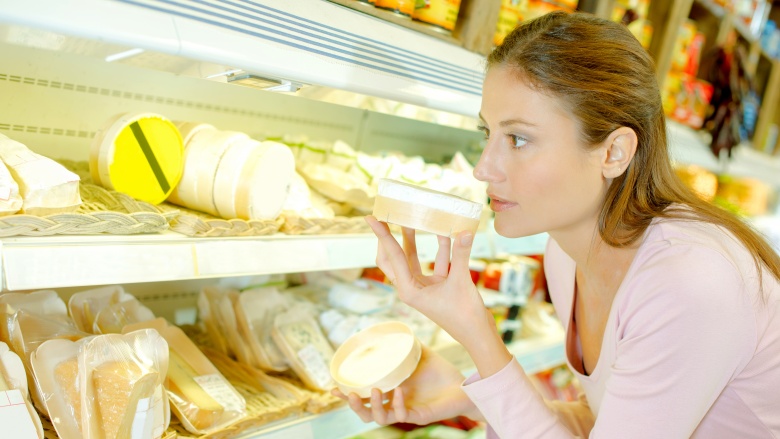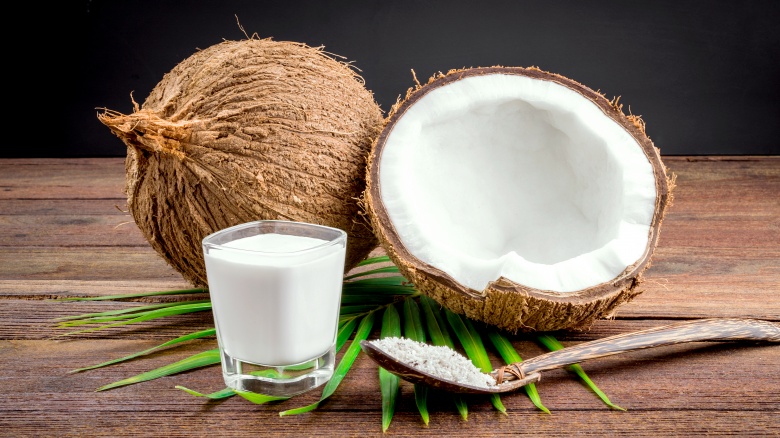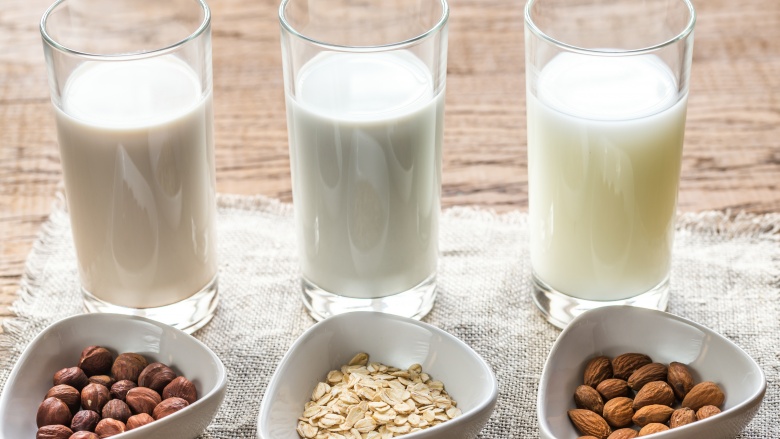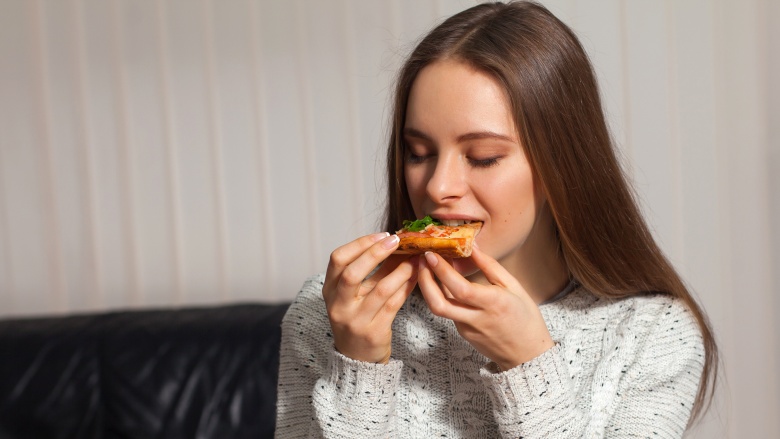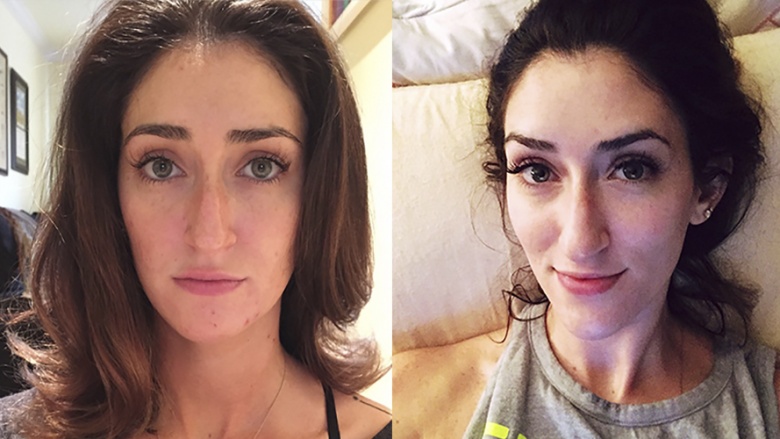This Is What Happens When You Stop Eating Dairy
My name is Caitlin Corsetti, and I'm a cheese addict. It's partially due to my Italian heritage, but also because cheese is delicious. I've never tasted a mozzarella I didn't like, or a sharp cheddar that didn't make me cry tears of joy. Don't even get me started on the Parmigiano-Reggiano! If there's cheese on something, I'll eat it. Pizza is one of my essential food groups, and I've been known to snack on a block of Monterrey Jack.
But about five months ago, I received Feta-crumbling news from my dermatologist: I had to cut dairy out of my diet.
Reenactment of me smelling cheese during my first dairy-free week
I laughed at first, thinking this was some sick horror film—A Nightmare on Pecorino Street—and then reality set in. My dermatologist explained I only needed to cut out dairy to see if it had an impact on my stubborn skin. You see, my struggle with acne spans nearly 12 years. From two rounds of Accutane to countless at-home remedies, my 26-year-old face still breaks out on the reg. My sweet dermatologist—bless her heart—was at a loss for what to do next. So in combination with my aesthetician, we all agreed I should adjust my diet to see how my skin reacts as dairy—from cows specifically—contains growth hormones that can lead to inflammation and breakouts.
And thus, I embarked on a dairy-free life. The first month was udderly (hehe) hellish. Seriously, you would have thought I was actually going through withdrawals. I didn't realize how much dairy I typically consumed on a daily basis, from butter to ranch dressing, which I would pour all over my pizza. I found myself craving mac and cheese, grilled cheese sandwiches, fondue, and even whole milk. Everywhere I looked, friends were offering me meals with dairy. I had to explain, "I can't have dairy," which always prompted a gasp and, "OMG are you lactose intolerant now?"
Note: coconut milk does work like regular milk
There are so many goods you don't realize contain dairy. I mean, sure, you know yogurt is dairy, but you probably never thought about it that much. Ranch dressing, chocolate, batter...dairy stomping grounds. Even items like sour cream and onion-flavored chips contain dairy! Completely avoiding it in my diet has been ridiculously difficult, but I've managed by substituting dairy products with non-dairy options. I'm not a fan of almond milk, so I opted for coconut milk instead, which is delicious and I highly recommend it. The fat content is a bit higher than other nut milks, but there are light options if that's a concern. Coconut milk is not for you, by the way, if you hate the taste of coconut. It doesn't taste like a piña colada or anything, but it does have a distinct flavor.
Whether you choose coconut, almond, soy, or some other dairy alternative, make sure you check the ingredients for carrageenan. These are polysaccharides extracted from seaweed, and are used in the food industry for stability and thickening. They're found in a lot of products, but are extremely common in dairy alternatives. There is still a ton of research surrounding the effects of carrageenan, but there are many reports of it increasing inflammation and causing gastro-intestinal issues. Totes up to you if you want to avoid it or not, but I was originally drinking Silk and my stomach did not agree. I've been fine ever since switching to a pure coconut milk, and I put it in coffee, cereal, smoothies, and more.
I also swapped in coconut Greek yogurt and coconut milk ice cream. I substituted in clarified butter—or ghee—for regular butter. Everything tasted about the same as products with dairy. There are tons of non-dairy options out there, but they are not all created equally. There are even dairy-free cheeses, but they are honestly offensive to cheese. If you're thinking about going dairy-free, it's going to take some trial and error before you find substitutes you love. Dairy substitutes taste a little different and cook differently as well. There's no substitute that will work for everyone, so try alternatives until you figure out what your body likes.
Your body off dairy
There are a lot of benefits to going dairy-free, but there are some downsides too. You've probably been taught, since you were young, that you had to have milk with dinner and get your dairy in for the day according to the food pyramid. Dairy nourishes our bodies with protein, vitamin D, calcium, and potassium. Those nutrients are super important! Won't you die if you stop drinking milk and eating cheese?
No, you won't. But if you decide to stop having dairy, keep in mind that you'll need to make up for the loss of dairy's nutrients in other ways. Because I want to have strong, healthy bones and not get osteoporosis, I started taking a calcium supplement, and I'd already been taking vitamin D supplements for years. I did notice after the first week that I wasn't getting a lot of protein, so I made a point to eat more meat and add high-protein foods like quinoa into my diet. Whatever you do, you should always speak to your doctor first, before taking any vitamins or supplements or drastically changing your diet.
Many people report weight loss after quitting dairy. I didn't lose weight, but that was never a goal of mine to begin with. I can tell you that I felt less bloated and puffy. Whenever I have a cheese relapse, I get an overall icky feeling. I generally just feel better overall, skin aside.
It's been 30 days since I last tasted cheese
While my life became increasingly dull without the light of cheese, my skin transformed into a glowing beacon of hope. Not one week after my no-dairy experiment, my face cleared up. Imagine having cystic acne for nearly half your existence and waking up one day with the clearest skin you've ever had. I also felt amazing. I almost cried, I was so happy! Except I was depressed because cheese.
The trauma set in: how was I supposed to live the rest of my years without cheese? I can live on coconut milk forever, but cheese? Forget it. I thought I could maybe limit my intake and have it occasionally. I was devastatingly wrong because since quitting dairy, every time I have a tiny bit of it, my skin breaks out the next day. Another example: after an aggressive night of partying, my hungover self needed pizza. It was the only cure. I ate three slices drenched in ranch dressing and slept like a baby. The next day, I woke up with a cluster of zits on my right cheek and a massive cyst on my left. Once I got those puppies under control, I slipped again a few weeks later, devouring some queso on a Taco Tuesday. I mean, you can't put me in front of a bowl of melted cheese and expect me not to conquer it. Again, I broke out the next day, badly.
Dairy-free is the way to be, apparently
It's now been five months since I gave up dairy. Living dairy-free is one of the most difficult commitments I've ever made. I'm not perfect at it by any means, and I learned that elimination, not moderation, is the key to keeping my skin clear. Without dairy, my face is as smooth as a baby's butt and glows from brightness, not oil. Physically, I feel 100 times better too. My energy levels are up, and I no longer feel sluggish. My overall digestive process is happier, but I don't know if I can sustain this lack of cheese forever.
Missy Elliot once asked, "Is it worth it?"
And the answer, sadly, is yes.

